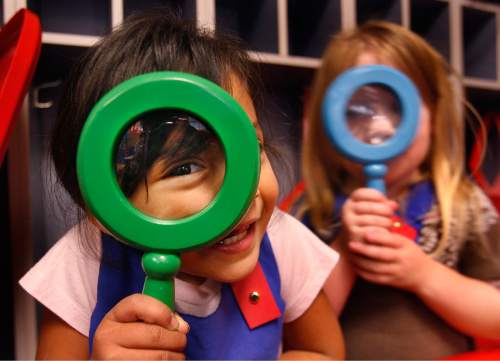This is an archived article that was published on sltrib.com in 2016, and information in the article may be outdated. It is provided only for personal research purposes and may not be reprinted.
Between 3,000 and 4,000 Utah children would have access to public preschool and early education programs if a bill approved unanimously by a Senate committee on Thursday becomes law.
The bill, SB101, would direct $11.5 million to expand public home-based and school preschool programs, as well as create an intergenerational poverty scholarship program to help low-income families enroll with private providers.
"We would like to see lots of different models tried out so we can find the best models," said Ogden Republican Sen. Ann Millner, the bill's sponsor.
Millner said there are roughly 4,400 preschool-age children affected by intergenerational poverty in the state, with an estimated 25,000 more at risk to enter kindergarten unprepared.
She said achieving grade-level literacy in elementary school is crucial; students who fall behind their peers are unlikely to catch up or excel in later grades.
"This will by no means meet all of our needs," she said, "but it's another step forward."
Lawmakers have passed several bills in recent years directed at early childhood intervention.
Public preschool, through school- or home-based options, is seen by many as a cost-effective way to improve educational outcomes in the state by avoiding costly special education and remediation in later years.
The programs are prioritized for low-income and English language learning students, who traditionally perform at lower academic levels than their more affluent and native English-speaking peers.
"We're not trying to see if it works," said Draper Republican Sen. Howard Stephenson. "We know based on third-party data that it works in a very high-level way."
In Granite District, often described as the state's gold standard for public preschool programs, students who attended preschool consistently enter kindergarten at higher achievement levels than their peers.
And district data show those student continuing to match or exceed the district average on year-end tests in the fourth and fifth grades.
Scott Ulbrich, a board chairman for the United Way of Salt Lake, said high quality preschool is transformative for at-risk students as they make progress and more easily keep up with their peers.
"I've seen this firsthand with the parents and their children currently receiving high-quality preschool in the Granite district," he said.
The bill was approved unanimously by the Senate Education Committee. It now advances to the full Senate for consideration.
Twitter: @bjaminwood



